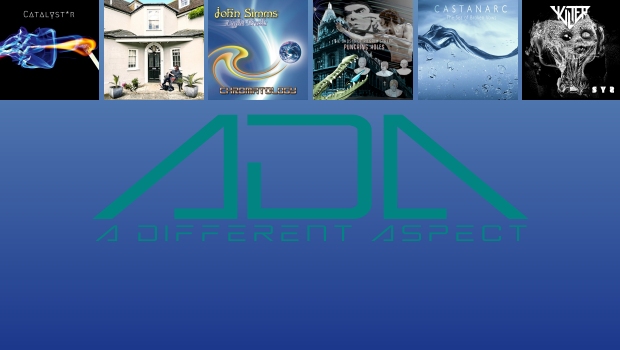In this ADA update we feature:
• Catalyst*R – Catalyst*R
• Vienna Circle – Secrets Of The Rising Sun
• John Simms Light Trails – Chromatology
• Punching Holes – The Ghosts Of Pilgrim Street
• Castanarc – The Sea Of Broken Vows
• Kilter – SYS [EP]
Nick Hudson
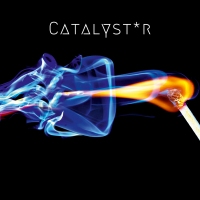
I’m surprised by how much I enjoy the debut release from Catalyst*R. I ought not to be surprised as it’s from the Progressive Gears label, who rarely don’t strike gold – and yet, the description of the music within didn’t exactly set me alight with anticipation. But heck, while this might be highly melodic prog of a poppy nature that errs towards AOR at times, most of it is so bloody good and full of hooks that I keep coming back to it – and it just sounds better every time. I’m particularly struck by the tone and playing of Gary Jevon on guitar (who plays everything but drums on this release), which is often particularly evocative and affective. He has some incredibly nifty bass licks, too. Basically, he is the star of the show for me (with apologies to Damian Child and Greg Pringle). If any other star shines as brightly, it’s not a member of the band so much as Will Geraldo who did the mastering of Gary’s mixes. Mastering can’t fix a bad mix, but there’s no worry of that here, so Will’s job is to enhance the mix and create the finest presentation of it – and there’s no doubting he’s done just that.
For a band that has not even been in the same room (being a product of last year’s succession of lockdowns, quarantines and isolation), there is no way you’d guess from listening. Of course, it probably helps that Gary handles the majority of the instrumentation, but even so, it all gels perfectly with the vocals (of Damian) and drums (of Greg). And it all gets off to a powerful start with Welcome to the Show, which not just rocks but even hints at metal. Certainly far stronger than my expectations. Hints of metal appear here and there throughout the album, with You Against the World being positively Maiden-esque, particularly reminiscent of the Blaze Bailey era (both musically and vocally) in the verses, if not in the more poppy chorus. This song sounds like it was born to be a crowd pleaser, and the crowd sounds that appear towards the end only confirm this. The band may be playing in different parts of the country, but their interplay from afar assures a great show when they do finally have a chance to perform live.
In case it hasn’t been evident already, the following In the Deep End shows off the versatility of Damien’s vocals. He has a good range, and reminds me a little of a mix of Greg Lake and Tim Bowness. To belabour the comparison to the former, In the Deep End is Damien’s sombre singing of I Talk to the Wind, after You Against the World’s scorching 21st Century Schizoid Man. Unfortunately, for me, In the Deep End isn’t so engaging as I Talk to the Wind, and, along with Someone Else’s Dream, is almost my least favourite song on the album. That’s merely a reflection of my tastes, though, rather than the quality of the song – which I’m sure will be many people’s favourite. Likewise, the following Immortal, which will likely be a standout track for many, but doesn’t do so much for me. It’s definitely the most AOR moment of the album, and gets my wooden spoon. The album ends on a real high point, though, with the epic and haunting Goldst*r – which out Raven’s Steven Wilson in creating a macabre musical ghost story. Despite my not really enjoying three of the tracks, I still don’t hesitate in recommending this album. It’s a debut very much worth checking out.
Bob Mulvey
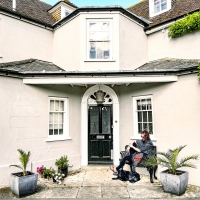
UK ‘ensemble’ Vienna Circle emerged circa 2006, released their debut concept album White Clouds in 2008 and followed it up five years later with Silhouette Moon, and I have to say both albums passed me by. So how did I come across album three? Well I have to thank Shaun Geraghty (The Prog Mill) on Progzilla Radio who played a track which caught my ear. So over to Bandcamp to check out Secrets of the Rising Sun.
A quick intro to Vienna Circle, who would appear to revolve around two brothers, Paul and Jack Davis, although for this latest release only multi-instrumentalist Paul appears to be present, albeit accompanied by two guests – drummer Alex Micklewright and vocalist Gemma Davis.
Secrets of the Rising Sun gets off to a great start with Golden Sunset Roulette, fading in with a driving staccato rhythm, but quickly releasing into a jazzier vibe with some deft guitar work backed by percussive organ. Within a couple minutes the track unleashes into a full-blown thematic guitar break. At ten minutes the track has time to evolve, recapitulate and stretch out, reprising again in the beefier Sunset Revolver, which can be found in the middle of the album. Following Golden Sunset Roulette we have the first of two brief instrumentals, both hugely melodic, so if tuneful thematic guitar floats your boat then these will surely delight.
Elsewhere across the album we have the catchy That Night with flavours of Mike Oldfield in the cleaner guitar parts and an earworm vocal melody sung by Gemma Davis. The instrumental Rivers gently meanders with some sweet guitar stirring the waters. The album’s piano ballad Fly Lady Fly, features a delightful vocal sung by Paul, and in time honoured ballady fashion concludes with an anthemic guitar solo.
Not that it’s a bad song, far from it, but the track that did least for me was the album’s stomping rocker title tune, whereas the wonderfully melodic instrumental Canyons, which closes out the album, firmly roots the music in Latimer/Camel territory. I Can See Your ‘Ice’ From Here ( 😉 ) brings the album 360° and a prefect place to start another revolution. Definitely worth checking out and it’s all on Bandcamp…
Roger Trenwith
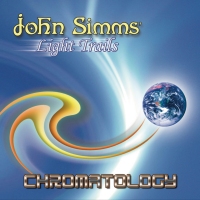
Still going strong after all these years, guitarist John Simms first came to my attention when I had barely entered my second decade on this planet. His band, the criminally under-promoted Clear Blue Sky, made one of those albums you found back in the early ’70s in supermarket cut out bins for 50p. I bought it, and it has remained a favourite ever since. Since then, John has continued to make music, sometimes with various versions of that band, and in his own name, and as guitar maestro for several underground acts, most recently the Census of Hallucinations tribe.
Here he is with a fine solo album of cosmic derring-do, occasionally funky, always spacey, and with just the right late night vibe. John plays everything on here, sometimes assisted by partner Maxine Martens’ lyrics and backing vocals, and David Hendry’s additional synths and keyboards. Census of Hallucinations’ Tim Jones adds backing vocals on Are We Nothing.
The end result is a highly polished excursion that will float the docking capsule of any willing space explorer.
Roger Trenwith
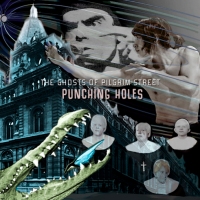
Punching Holes emerged into the post industrial gloom of Newcastle in 1980, formed by singer Brian Bond, on the lam from Punishment of Luxury. Also in their number was Tim Jones (see John Simms review above), and on bass guitar, none other than Sid Smith.
Rescued and restored from a cassette of demos, this new vinyl and digital issue takes us back to the heady days of post-punk, and a highly inventive… dare I say progressive?… period in British music. Shot through with the febrile nervous energy of the times, and channelling the likes of Devo and early Talking Heads, although it bounds along with a spring its many-time-signatured step, it has to be said it hasn’t dated too well, but is enjoyable as a period piece nonetheless. Brian’s misanthropic and occasionally topical lyrics are what makes this rise above the mundane.
I would imagine that as a live band this troupe were highly entertaining, and I have no doubt that this LP is a must-have if you were there.
David Edwards
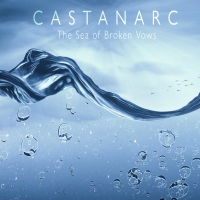
It was way back in 1984 that Doncaster’s Castanarc released their debut album, Journey to the East, during that first wave of neo-prog rock. It was well-received by many and represented the softer, more gentle and atmospheric side of the fledgling genre, compared to the more dynamic and complex work of their peers. The melodic interplay between David Powell’s keyboards and Paul Ineson’s guitar, behind the smooth, almost Jon Anderson-like, vocals of Mark Holiday, created a more fluid and contemplative style of melodic prog. However, for a number of reasons, they were not able to capitalise on their early promise at the time and while a later ’80s regrouping saw a number of further studio releases, the band were destined to remain a small footnote in the history of UK progressive rock.
However. several decades later Mark and David have resurrected Castanarc and just released a new studio album called The Sea of Broken Vows. Joined by producer John Spence and regular guest musicians Neil Duty and Pat Mount (guitars), Pete Robinson (bass), Charlie Morgan (drums) and Steve Beighton (saxophone), together with Angela Gordon of Mostly Autumn (flute & low whistle), they have created an easy listening and melodic, song-orientated, soft prog album which flows along pleasantly enough.
As in their earlier incarnation, don’t necessarily expect the instrumental complexity and intricacy of their more renowned neo-prog contemporaries. Those early influences of Pendragon, Pallas, Jadis and Saga along with Camel are still hovering in the background, but Mark’s vocals are more mellow and the music is framed into supporting a more modern and popular style of song structure. Whilst undoubtedly many of the eleven tracks have a similar soft rock smoothness and melodic feel to them – often with a steady, medium tempo, and wistful vocals – there are moments when the music does catch fire and display a more dynamic proggy edge. A Song Rings Out starts with the quiet sound of dripping water, but then has a powerful guitar-based Mystery-like introduction and trots along very melodically. The Ascent of Man starts with symphonic and stately keyboard chords, but then introduces a jaunty Celtic beat and a spirited guitar solo with some lovely saxophone to end. Helicopter noises and distorted, chiming guitar herald The Walking of the Earth – another album highlight, which is nicely upbeat, with a catchy melody and refrain with vibrant keyboard runs.
For the Want of A Nail closes the album pleasantly with some soaring guitar work, cheerily taking us full circle to the sound of dripping water once again. There are nice touches elsewhere, Angela’s flute and whistle not surprisingly adding a touch of Mostly Autumn on a couple of tracks. Delicate piano and acoustic guitar sections provide a lift in the variety during several of the shorter songs.
If I am being hyper-critical, there are songs which display a similar tone and pace to them, which whilst still being well-crafted and sung expressively don’t quite engage the listener as well as others and sort of flow over you. With all but the closing track being under 5-minutes in length, it would have been nice to have seen the music given more free-rein to develop into something more epic, perhaps – but such nit-picking aside, the album is a well-produced and enjoyable listen overall.
From a progressive rock viewpoint, The Sea of Broken Vows breaks no new ground, but after all those intervening years between studio releases, it will most definitely please the band’s long-standing fanbase and even attract some new listeners who like their prog rock on the more melodic, accessible and popular side. Mark, David and John deserve praise for keeping the Castanarc flame shining for a little longer. Check it out on their Bandcamp site and see if it strikes a chord with you.
Nick Hudson

It seems barely a year ago that I reviewed Kilter’s debut full-length, Axiom, and here they are back with another release. I love the idea behind this short and sweet EP, which was to give each member of Kilter a chance to shine on their own track. It’s not a new idea by any means, but this is definitely the best presentation of it I’ve seen. Far too often this sort of exercise merely throws up inferior pieces that simply sound as if they are missing something – namely full contributions from all musicians. Kilter, however, are all fully onboard for each of the three numbers, and we are once more treated to a delicious selection of free jazz noir.
My favourite of the three tracks comes first, highlighting the drumming of Kenny Grohiwski, who skitters and crashes all over the place, holding the piece together on the precipice of impending doom. There’s some awesome syncopation, and the cohesiveness of the trio is outstanding. They play in, around, with and against each other to great effect. Laurent David, on bass, and Ed Rosenberg III, on bass saxophone, absolutely excel on this track, so it’s definitely not entirely Kenny’s show. However he is undoubtedly the star, and it’s always the drums that the track comes back to.
It’s Ed’s turn next, on The Turing Test, and this track belies the intensity in its opening passages as it slinks and slides along in a surprisingly smooth manner, before upping the metal to jazz ratio. After the tumultuous birth of the Sentient Robot, the music of SYS seems to observe silently, before engaging, imitating and confronting as it attempts to pass The Turing Test. The variety of moods presented by Ed, and ably backed by Kenny and Laurent makes this a real pleasure to listen to. It’s perhaps not as accessible and easy to listen to as Sentient Robot, but it’s just as rewarding.
Finally, band leader Laurent gets to take centre stage on what is, I guess, the heaviest track of the EP, Mind-Body Problem, which I suspect will be the favourite for most listeners – though it is just pipped by Sentient Robots, for me. Mind-Body Problem is the most similar in sound to Axiom, which makes it a really nice way to end the EP as it has the warmth and comfort of familiarity. It is also almost twice the length if you purchase the EP from Kilter’s Bandcamp page, and this is something I should probably address. I’m not sure if this is a deliberate ploy to entice people to buy the EP, rather than stream it, but I can certainly assure you that I would choose the full versions over the short ones every time.

